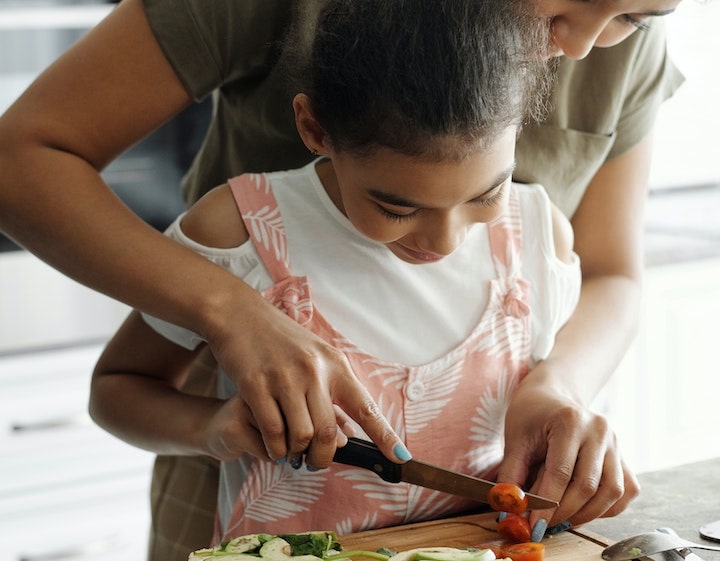
 Post Category - WellnessWellness - Post Category - NutritionNutrition
Post Category - WellnessWellness - Post Category - NutritionNutritionI know this sounds crazy, but what if we got rid of the stress and pressure at meals times to make our kids ‘eat right’ and changed the narrative around feeding our children?
Do you find yourself repeating the same things over and over at the dinner table in an attempt to get your kids to eat more veg? Finish their plate? Have one more bite? Does it feel like there is a constant power struggle at the dinner table? You know, it doesn’t have to be this way!?
As parents we all want the best for our children, including making sure they are eating enough and eating right for healthy growth and development. But the thing is, if we want to raise our children to have a healthy relationship with food (and their bodies), then we need to let go of the idea that it is within our control as parents to decide exactly what and how much our kids eat.
As a Dietitian and Nutritionist, and a mother of two, I am a firm believer in intuitive eating (an evidenced-based approach that encourages body awareness, tuning into your own body’s signals, and honouring and trusting them). Here are my top tips to get rid of mealtime stress and arguments, and to nurture your children’s innate ability to eat intuitively:
1. Ditch the Rules & Rewards:
Stop bartering or bargaining over meals. This includes offering bribes and rewards, whether they be food rewards (like desserts) or getting to do a certain activity (like watch TV) in exchange for ‘a few more bites’. This creates a hierarchy in terms of the value of foods and makes some foods (e.g., ice cream or dessert) seem more valuable or desirable than others (the broccoli you are trying to convince them to eat)! We need to teach children that all foods have a place in a balanced diet.
2. Mind Your Language:
Try not to use words like healthy/unhealthy, good/bad, junk/clean food. Teaching children that some foods are good and others bad is not helping them make balanced food choices. In fact, children tend to have black and white thinking and will assume that if they eat these ‘bad’ foods, it will mean they are a bad person. It turns food and eating into a moral issue, when it shouldn’t be as food is a basic need. Plus, studies have shown that talking about foods as unhealthy actually makes children want them more. Importantly, demonizing foods can be extremely triggering to any children at risk of disordered eating or an eating disorder.
3. Trust Your Child:
All of us are born with amazing intuitive eating skills – just look at babies who cry when they are hungry and throw the food on the floor when they are done. They eat foods you wouldn’t expect them to eat one day and refuse their so-called favourite food another. Unfortunately, as they get older, we teach them NOT to trust their bodies and these internal signs of hunger and fullness, and instead to listen to external cues like finishing everything on their plate even if they are full. As parents we need to listen to our children and respect when they say they are full or don’t feel like eating something. It’s not our job to control if and how much our kids eat but instead to decide what food to provide and when, and let our children take responsibility for what they choose from what is on offer, and how much they want to have.
4. Kids need structure:
So, it’s your role as a parent to provide meals at fairly similar times each day – younger kids especially need familiar routines and to know when food is coming – this is food security. But be flexible – if you offer 3 meals and 2 snacks every day don’t expect them to always eat the same amount and some days, they might not want a snack at all.

5. Exposure is Key:
Focus on teaching children about food, where it comes from, its flavours and textures, how different foods make us feel, and what they do for our bodies. Getting kids in the kitchen and teaching them how to cook and prepare food increases their exposure to foods and allow them to taste them without expectation. Exposure to new and different foods is key in promoting a varied and balanced diet, but foods should be offered without expectation or pressure to try them. The more often they are exposed, the more likely they are to feel comfortable around new foods and give them a taste.
6. Have Family Meals:
Make mealtimes about family time rather than focusing on the food. Use it as a time to catch up on everyone’s day, discuss future plans, or to talk about recent events or successes. Remove distractions and outside stimuli like screens and music and make it a time to connect, talk, and relax rather than it being high stress with children feeling like they are under pressure to eat. The good news is that children who have family meals do better in many ways: nutritionally, academically, socially, emotionally, – in fact family meals have a stronger effect on positive outcomes for children and adolescents than anything else – extracurricular activities, music lessons, tutoring etc*.
7. Address your own relationship with food:
Often, becoming parents is a time when we reflect on our own behaviours and actions as we consider what kind of parents we want to be and what we want to teach our children. I’m sure you can remember how your own parents spoke about food and their bodies, if they were on and off diets or talking negatively about themselves in the mirror – and this tends to be especially true about mothers. Children learn the most from role modelling, so setting a good example of what a healthy relationship with both food and our bodies looks like is a really important part of raising intuitive eaters. (If you are worried about your relationship with food or your body then get in touch with a registered dietitian, as there’s plenty we can do to support you in improving both of these).
Ok so you might be thinking these are all great ideas but if I don’t tell them what to eat then ‘my kids will only ever choose rice and chicken/chips and ketchup’! It may feel like this at the beginning but once you take the pressure away from mealtimes and show your children that you trust them, remove the moral value of food, show them that all foods fit, and role model what a good relationship with food looks like, then your children will probably surprise you.






 View All
View All




 View All
View All









 View All
View All




